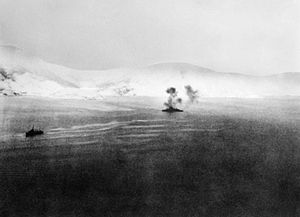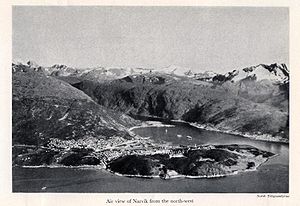First Battle of Narvik
| Naval battle preceding the first naval battle of Narvik | |||||||
|---|---|---|---|---|---|---|---|
| Part of the Second World War | |||||||
|
|||||||
| Belligerents | |||||||
|
|
|
||||||
| Commanders and leaders | |||||||
|
|
|
||||||
| Strength | |||||||
| 2 coastal defence ships | 10 destroyers | ||||||
| Casualties and losses | |||||||
| 2 coastal defence ships sunk 343 dead |
None | ||||||
| First naval battle of Narvik | |||||||
|---|---|---|---|---|---|---|---|
| Part of the Second World War | |||||||
 A map of the Narvik area |
|||||||
|
|||||||
| Belligerents | |||||||
|
|
|
||||||
| Commanders and leaders | |||||||
|
|
|
||||||
| Strength | |||||||
| 5 destroyers | 10 destroyers | ||||||
| Casualties and losses | |||||||
| 2 destroyers sunk 1 destroyer heavily damaged |
2 destroyers sunk 1 ammunition supply ship sunk 6 cargo ships sunk 4 destroyers damaged 163 casualties |
||||||
| Second naval battle of Narvik | |||||||
|---|---|---|---|---|---|---|---|
| Part of the Second World War | |||||||
 Warspite engaging shore batteries during the Second Battle of Narvik. |
|||||||
|
|||||||
| Belligerents | |||||||
|
|
|
||||||
| Commanders and leaders | |||||||
|
|
|
||||||
| Strength | |||||||
| 1 battleship 9 destroyers 1 aircraft carrier a small number of aircraft |
8 destroyers 2 U-boats |
||||||
| Casualties and losses | |||||||
| 3 destroyers damaged 28 killed 55 wounded |
8 destroyers sunk or scuttled 1 U-boat sunk 128 killed 67 wounded |
||||||
| Battle of Narvik | |||||||
|---|---|---|---|---|---|---|---|
| Part of the Second World War | |||||||
 Narvik during the Second World War |
|||||||
|
|||||||
| Belligerents | |||||||
|
|
|
||||||
| Commanders and leaders | |||||||
|
|
|
||||||
| Strength | |||||||
|
Norwegian 6th Division Four British battalions Three battalions of Chasseurs Alpins Two battalions of 13th Demi-Brigade of the Foreign Legion 342e CACC (15 Hotchkiss H35 tanks) Four battalions of the Polish Independent Highland Brigade Total:24,500 men |
2,000 Gebirgsjägers (mostly from Austria) |
||||||
The Battles of Narvik were fought from 9 April to 8 June 1940 as a naval battle in the Ofotfjord and as a land battle in the mountains surrounding the north Norwegian city of Narvik as part of the Norwegian Campaign of the Second World War.
The two naval battles in the Ofotfjord on 10 April and 13 April were fought between the British Royal Navy and Nazi Germany's Kriegsmarine, while the two-month land campaign was fought between Norwegian, French, British, and Polish troops against German mountain troops, shipwrecked Kriegsmarine sailors and German paratroopers (Fallschirmjäger) from the 7th Air Division. Although defeated at sea off Narvik, losing control of the town of Narvik and being pushed back towards the Swedish border, the Germans eventually prevailed because of the Allied evacuation from Norway in June 1940 following the Battle of France.
Narvik provided an ice-free harbour in the North Atlantic for iron ore transported by the railway from Kiruna in Sweden. Both sides in the war had an interest in securing this iron supply for themselves and denying it to the enemy, setting the stage for one of the biggest battles since the Invasion of Poland.
Prior to the German invasion, British forces had considered Narvik as a possible landing point for an expedition to help Finland in the Winter War. Such an expedition also had the potential of taking control of the Swedish mines and opening up the Baltic for the Allies. French politicians were also eager to start a second front as far away from France as possible.
...
Wikipedia
